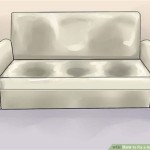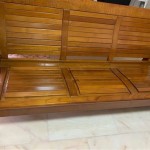Is It Ok To Sleep On A Sofa? Exploring the Short and Long-Term Implications
The question of whether it is acceptable to sleep on a sofa is multifaceted, encompassing considerations of comfort, health, and circumstance. While occasionally dozing off on a sofa may pose no significant harm, routinely using it as a primary sleeping surface can lead to a range of physical and psychological issues. This article aims to explore the potential ramifications of sofa sleeping, providing a comprehensive overview of the factors to consider before making this a habit.
Sofa design prioritizes seating and lounging comfort, not necessarily ergonomic support for sleep. The cushions and structure are intended to distribute weight in a seated position, often lacking the firm, consistent support required for spinal alignment during sleep. This disparity can contribute to musculoskeletal problems over time. Furthermore, the limited space on a sofa often forces individuals into awkward or contorted sleeping positions, exacerbating existing discomfort or creating new ones.
Beyond the structural design, the materials used in sofa construction also play a role. Sofas are typically upholstered with fabrics that, while aesthetically pleasing, may not be breathable or hypoallergenic. This can lead to increased sweating, skin irritation, or allergic reactions for sensitive individuals. Dust mites and other allergens can also accumulate within the sofa cushions, further contributing to respiratory problems and skin sensitivities.
Key Point 1: The Impact on Spinal Health and Posture
One of the most significant concerns related to regularly sleeping on a sofa is the potential negative impact on spinal health and posture. A proper mattress provides consistent support, aligning the spine and allowing the muscles to relax. Sofas, on the other hand, often lack this uniform support, leading to spinal misalignment. The uneven distribution of weight can place undue stress on certain areas of the back, neck, and hips.
Over time, this misalignment can result in chronic back pain, stiffness, and muscle imbalances. The curvature of the spine can become exaggerated, leading to conditions like scoliosis or kyphosis. Poor posture, characterized by rounded shoulders and a forward head posture, can also develop as the body compensates for the lack of support. These postural changes can further contribute to pain and discomfort, as well as impacting breathing and digestive function.
The problem is often compounded by the limited space available on a sofa. Individuals may be forced to sleep in a curled-up or twisted position, which further exacerbates spinal misalignment. The lack of room to stretch out and move freely can also lead to muscle cramping and stiffness. The absence of proper head and neck support can result in neck pain, headaches, and even nerve compression.
Furthermore, the soft cushions of a sofa can sometimes offer insufficient support, causing the spine to sag or overextend. This can place excessive strain on the ligaments and discs of the spine, increasing the risk of injury. The lack of consistent support can also disrupt sleep patterns, as the body is constantly adjusting to find a comfortable position.
Individuals with pre-existing spinal conditions, such as herniated discs or arthritis, are particularly vulnerable to the negative effects of sofa sleeping. The lack of proper support can aggravate these conditions, leading to increased pain and disability. It is therefore crucial for these individuals to prioritize a supportive sleeping surface that promotes spinal alignment.
Key Point 2: Sleep Quality and Its Ripple Effects
The quality of sleep obtained on a sofa is often compromised due to various factors, including discomfort, noise, and light exposure. Disrupted sleep patterns can have far-reaching consequences, impacting physical and mental health, as well as overall well-being. Chronic sleep deprivation has been linked to a range of health problems, including weakened immune function, increased risk of cardiovascular disease, and impaired cognitive function.
The uncomfortable nature of sofa sleeping can lead to frequent awakenings throughout the night, preventing the body from entering the deeper stages of sleep necessary for restoration and repair. The constant tossing and turning to find a more comfortable position disrupts the sleep cycle, reducing the overall duration and quality of sleep. Insufficient sleep can result in daytime fatigue, difficulty concentrating, and reduced productivity.
Furthermore, sofas are often located in living areas, which are typically more exposed to noise and light than bedrooms. These external stimuli can further disrupt sleep, making it difficult to fall asleep and stay asleep. Light exposure, in particular, can interfere with the production of melatonin, a hormone that regulates the sleep-wake cycle. Exposure to blue light emitted from electronic devices can also suppress melatonin production, making it harder to fall asleep.
The psychological impact of poor sleep quality can also be significant. Chronic sleep deprivation has been linked to increased anxiety, depression, and irritability. It can also impair emotional regulation and decision-making abilities. The cumulative effects of sleep deprivation can negatively impact relationships, work performance, and overall quality of life.
Individuals who regularly sleep on a sofa may also experience daytime sleepiness, which can increase the risk of accidents and injuries. Drowsiness can impair reaction time and judgment, making it more difficult to perform tasks that require attention and focus. This is particularly concerning for individuals who operate machinery or drive vehicles.
Key Point 3: Addressing the Underlying Reasons for Sofa Sleeping
Often, the decision to sleep on a sofa is not a matter of choice but rather a consequence of circumstances. Limited living space, financial constraints, or temporary living arrangements can all contribute to sofa sleeping becoming a regular occurrence. Addressing the underlying reasons for sofa sleeping is crucial for finding more sustainable and healthier alternatives.
In situations where limited living space is the primary factor, exploring space-saving solutions may be beneficial. Fold-out beds, futons, or Murphy beds can provide a more comfortable and supportive sleeping surface without taking up excessive space during the day. These options can be particularly useful in studio apartments or small homes where a dedicated bedroom is not available.
Financial constraints can also make it difficult to afford a proper mattress and bed frame. In these situations, exploring budget-friendly options may be necessary. Used mattresses in good condition can often be found at affordable prices, and basic bed frames can be constructed relatively inexpensively. Prioritizing sleep comfort and spinal support should remain paramount, even when working within a limited budget.
Temporary living arrangements, such as staying with friends or family, can also necessitate sofa sleeping. In these situations, discussing sleep arrangements with the host and exploring alternatives, such as an air mattress or sleeping bag, may be appropriate. Bringing a supportive pillow and blanket can also help to improve comfort and sleep quality.
Beyond practical considerations, addressing any underlying health conditions that may be contributing to sleep problems is also important. Conditions such as sleep apnea, insomnia, or restless legs syndrome can significantly impact sleep quality and may require medical intervention. Consulting with a healthcare professional can help to identify and manage these conditions, improving overall sleep health.
Finally, establishing healthy sleep habits is crucial for promoting restful sleep, regardless of the sleeping surface. Maintaining a regular sleep schedule, creating a relaxing bedtime routine, and optimizing the sleep environment can all contribute to improved sleep quality. Avoiding caffeine and alcohol before bed, limiting screen time, and ensuring a dark, quiet, and cool sleep environment can also promote better sleep.

Does Sleeping On The Couch Have Any Health Benefits Or Side Effects

Is It Bad To Sleep On The Couch Pulse Blog

Is It Bad To Sleep On The Couch Pulse Blog

Is Sleeping On The Couch Ok

Why Do I Fall Asleep On The Sofa But Am Wide Awake When Get To Bed

How Bad Is Sleeping On The Couch Saatva

Sleeping On The Couch Is It A Good Or Bad Idea Transfer Master

Why You Snooze On The Couch But Then Can T Sleep Cnn

Sleeping On The Couch Pros Cons Sleep Advisors

Does Sleeping In A Recliner Chair Have Any Benefits Or Side Effects








